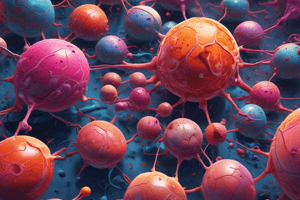Podcast
Questions and Answers
Which type of cell injury results in recovery and reestablishment of cell's health?
Which type of cell injury results in recovery and reestablishment of cell's health?
- Hypoxia
- Irreversible
- Immune reactions
- Reversible (correct)
Which of the following is NOT a cause of cell injury?
Which of the following is NOT a cause of cell injury?
- Immune reactions
- Genetic mutations (correct)
- Hypoxia
- Aging
Which agent may cause cell injury through reduction of oxygen supply to tissues below physiological level?
Which agent may cause cell injury through reduction of oxygen supply to tissues below physiological level?
- Fungi
- Hypoxia (correct)
- Bacteria
- Viruses
What type of immune reaction causes cell injury mediated by antibodies or T-cells directed against exogenous (non-self) antigens?
What type of immune reaction causes cell injury mediated by antibodies or T-cells directed against exogenous (non-self) antigens?
What may also cause cell injury apart from nutritional deficiencies and excesses?
What may also cause cell injury apart from nutritional deficiencies and excesses?
Which type of cell injury cannot be regained after the removal of physiologic stress and pathologic stimuli?
Which type of cell injury cannot be regained after the removal of physiologic stress and pathologic stimuli?
What is the primary cause of cell injury through reduction of oxygen supply to tissues below physiological level?
What is the primary cause of cell injury through reduction of oxygen supply to tissues below physiological level?
Which immune reaction causes cell injury mediated by antibodies or T-cells directed against exogenous (non-self) antigens?
Which immune reaction causes cell injury mediated by antibodies or T-cells directed against exogenous (non-self) antigens?
What may cause cell injury apart from nutritional deficiencies and excesses?
What may cause cell injury apart from nutritional deficiencies and excesses?
Which agent can cause cell injury through various forms such as viruses, bacteria, fungi, and protozoa?
Which agent can cause cell injury through various forms such as viruses, bacteria, fungi, and protozoa?
Which of the following is an example of a normal cellular constituent accumulated in excess?
Which of the following is an example of a normal cellular constituent accumulated in excess?
What is the primary cause of accumulation of an abnormal exogenous substance in cells?
What is the primary cause of accumulation of an abnormal exogenous substance in cells?
In which location do substances frequently accumulate within the cell?
In which location do substances frequently accumulate within the cell?
Which type of cell injury results from the cells producing an abnormal substance?
Which type of cell injury results from the cells producing an abnormal substance?
What causes the accumulation of a normal endogenous substance when the rate of metabolism is inadequate to remove it?
What causes the accumulation of a normal endogenous substance when the rate of metabolism is inadequate to remove it?
Flashcards
Reversible Cell Injury
Reversible Cell Injury
Cell injury that allows recovery and return to normal health.
Hypoxia
Hypoxia
A reduction of oxygen supply to tissues below physiological levels.
Hypersensitivity Reactions
Hypersensitivity Reactions
Immune reactions mediated by antibodies or T-cells against non-self antigens that lead to cell damage.
Microorganisms
Microorganisms
Signup and view all the flashcards
Irreversible Cell Injury
Irreversible Cell Injury
Signup and view all the flashcards
Transient accumulation
Transient accumulation
Signup and view all the flashcards
Abnormal exogenous substance accumulation cause
Abnormal exogenous substance accumulation cause
Signup and view all the flashcards
Inadequate metabolism
Inadequate metabolism
Signup and view all the flashcards
Causes of Cell Injury
Causes of Cell Injury
Signup and view all the flashcards
Normal Cellular Constituents Accumulated in Excess
Normal Cellular Constituents Accumulated in Excess
Signup and view all the flashcards
Other causes of cell injury
Other causes of cell injury
Signup and view all the flashcards
Study Notes
Cell Injury Types and Recovery
- Reversible cell injury: Occurs when cells can recover and reestablish health upon removal of the stressor.
- Irreversible cell injury: Results in permanent damage; cells cannot regain function after the removal of physiological stress and pathological stimuli.
Causes of Cell Injury
- Common causes of cell injury: Include reduced oxygen supply, immune reactions, infections, and toxicity.
- Not a cause of cell injury: Undefined in the provided questions; requires clarification.
- Reduction of oxygen supply: Major factor leading to cellular injury is hypoxia, which severely limits aerobic metabolism.
- Infectious agents: Various forms, such as viruses, bacteria, fungi, and protozoa, can induce cell injury through pathogen-induced damage.
Immune Reaction Mechanisms
- Immune-mediated cell injury: Involves antibodies or T-cells targeting exogenous (non-self) antigens, primarily seen in autoimmune diseases or reactions.
- Type of immune reaction: Can cause injury through mechanisms like hypersensitivity or allergic reactions.
Cellular Accumulation
- Normal cellular constituents: Examples include lipids or proteins that can accumulate in excess due to metabolic issues or pathological conditions.
- Primary causes of accumulation: Abnormal exogenous substances often result from environmental toxins or infectious agents, affecting cellular functions.
- Common accumulation sites: Substances frequently accumulate within the cytoplasm or organelles of the cell.
Metabolic Implications
- Normal endogenous substance accumulation: Happens when metabolic processes are inadequate to eliminate substances, leading to conditions like fatty liver disease.
- Abnormal substance production: Cells may generate excess normal substances due to metabolic disorders, contributing to pathological states.
Studying That Suits You
Use AI to generate personalized quizzes and flashcards to suit your learning preferences.




